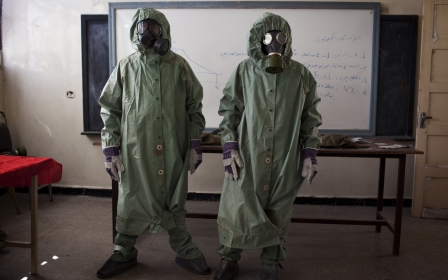UN accused of 'capitulating' to Assad's starvation tactics in Syria

The UN has been accused of "capitulating" and effectively taking sides with Damascus in the Syrian war by allowing the government to dictate who benefits from international aid, contributing to the deaths of thousands of civilians in sieges of rebel-held areas.
A scathing 50-page report by the Syria Campaign (TSC) advocacy group, released on Wednesday, says UN agencies have since 2011 consistently kowtowed to government threats, leading to a situation where the vast majority of aid is delivered to government areas.
The report, titled "Taking Sides", was signed by 55 Syrian organisations opposed to the government, including the White Helmets organisation, which is made up of emergency responders in rebel-held areas.
Based on evidence from current and former UN staff and other aid workers, the report says that the UN in Syria was "in breach of its humanitarian principles and therefore at risk of fuelling the conflict".
"There has been a systematic failure in the UN-led response," said Roger Hearn, who headed the UN's Palestinian refugee agency in Damascus until December 2011 and contributed to the report.
"Rather than basing its response on need, it has developed into a billion-dollar response programme that is largely controlled by the regime and its proxies," Hearn said.
The report states that the UN has been forced to allow the Syrian government an effective power of veto on its operations in Syria since 2011, when the government threatened to remove foreign UN workers from the country if they delivered aid to Daraa.
"As a result, a culture of compliance was born," the report says. "The Syrian government has used this threat consistently since then to manipulate where, how and to whom the UN has been able to deliver humanitarian aid."
This, in turn, has enabled the Syrian government to starve rebel-held areas, the report says.
"The UN has provided the Syrian government with an effective veto over aid deliveries to areas outside of government control, enabling its use of sieges as weapons of war," it said.
Such a policy, the report said, "has contributed to the deaths of thousands of civilians, either through starvation, malnutrition-related illness, or a lack of access to medical aid".
'Profoundly flawed'
The UN admitted earlier this month that humanitarian aid drops to besieged areas were "not imminent", after reports of opposition from the Syrian government in Damascus and its staunch ally in Russia.
One anonymous UN official interviewed for the report called the organisation's work in Syria "a profoundly flawed and one-sided operation," while another pointed out that security precautions for UN staff are agreed with the Syrian government.
The report accused the UN of "choosing to prioritise cooperation with the Syrian government at all costs", allowing it to unduly influence UN aid strategy.
As a result, an overwhelming amount of assistance in Syria goes into government-held territory where permission is provided instead of opposition areas where aid is most needed, the report said.
In Apri, "88 percent of food aid delivered from inside Syria went into government-controlled territory", it said.
Even the language used by the UN, the report alleges, is dictated by the Syrian government - it cites a 2016 Humanitarian Response Plan prepared by the UN, in which the words "besieged" and "conflict" were removed at the request of the Syrian government, as reported by Middle East Eye.
It also accused UN agencies including the World Health Organisation of co-operating with the Syrian government while ignoring tens of thousands of people in dire humanitarian, highlighting a February 2016 meeting between WHO officials and Syria's tourism minister, in which the government was praised for being "one of the first countries in the Eastern Mediterranean region which has ratified international conventions on combating smoking".
Responding to the report, the UN humanitarian coordinator for Syria, Yaacoub El Hillo, said that while aid access is not ideal, the UN continues to "assist Syrians based on need".
Hillo said the UN does "not assist Syrians based on location. We assist Syrians based on need."
Taking a convoy full of aid to a besieged town without proper authorisation would be a "suicide mission for humanitarian workers", he said.
Speaking to Al Jazeera, UN spokesperson Stephane Dujarric said accusations of UN bias discredited "the amazing work our colleagues, mostly Syrians, are trying every day to deliver aid to the Syrian people".
Chris Doyle, the director of the Council for Arab-British Understanding, told Middle East Eye that "the entire international community had utterly failed the Syrian people over the last five years".
"Weaknesses on the ground and the failure to stand up to the Syrian government reflect the divisions in New York, but also a lack of leadership from those countries that do claim to care about Syrian civilians."
The report recommends that UN agencies publicly lay out conditions for continued cooperation with Damascus and sever work with the government if they are not met.
"A UN operation that violates its humanitarian principles becomes party to the conflict and stands accused of doing harm," it said.
Hillo admitted the government had "obstructed" access to some besieged areas: "But because of it, do we condemn the rest to starvation?"
Stay informed with MEE's newsletters
Sign up to get the latest alerts, insights and analysis, starting with Turkey Unpacked
Middle East Eye delivers independent and unrivalled coverage and analysis of the Middle East, North Africa and beyond. To learn more about republishing this content and the associated fees, please fill out this form. More about MEE can be found here.




